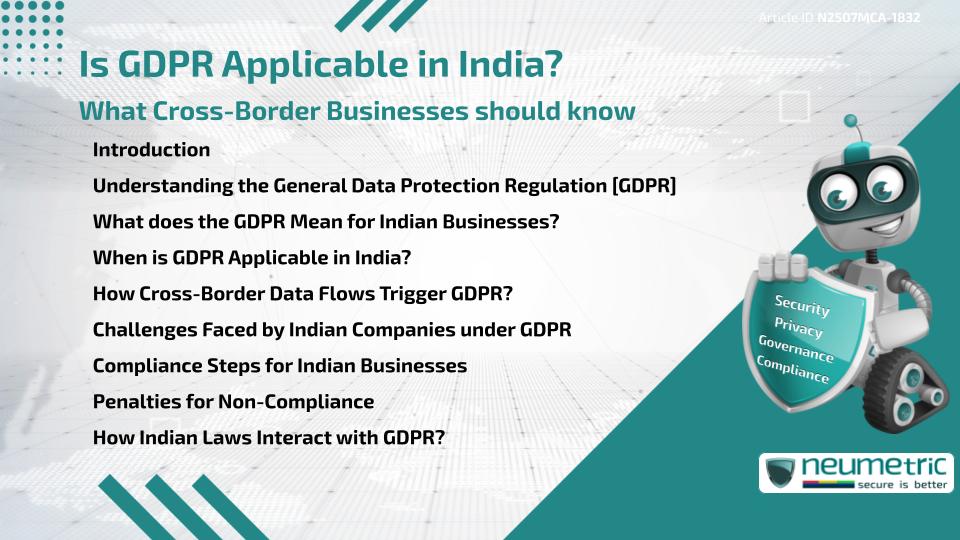Table of Contents
ToggleIntroduction
As the digital world grows increasingly interconnected, Data Privacy regulations have taken center stage. One Regulation that continues to impact global operations is the General Data Protection Regulation [GDPR], which was introduced by the European Union [EU] in 2018. It sets strict rules on how Personal Data must be Collected, Processed & Stored. But is GDPR applicable in India? This is a critical question for any Indian Company dealing with International Clients or Users, especially those located in the EU.
This article explores the scope of the GDPR, when & how it applies to Indian Businesses & what steps organisations must take to remain compliant.
Understanding the General Data Protection Regulation [GDPR]
The GDPR is a legal Framework created to protect the Privacy Rights of Individuals within the EU. It governs how organisations handle Personal Data & grants data subjects rights such as Consent, Access, Rectification & Erasure.
Key elements of the GDPR include:
- Extraterritorial reach
- Consent requirements
- Data subject rights
- Breach notification timelines
The Regulation is enforced by Data Protection Authorities [DPAs] in EU member states. Penalties for violations can reach up to twenty (20) million euros or four percent (4%) of global turnover, whichever is higher.
What does the GDPR Mean for Indian Businesses?
Indian Businesses might assume the GDPR does not affect them since India is not part of the EU. However, that is not the case. The GDPR’s territorial scope extends beyond EU borders. So, is GDPR applicable in India? Yes, if Indian Businesses process the Personal Data of Individuals in the EU or offer them Goods or Services.
This includes:
- SaaS Platforms serving EU Users
- Indian BPOs handling EU Client Data
- E-commerce Websites targeting EU Customers
- Travel Agencies booking EU Trips
Any Indian Company Collecting or Processing Data from EU Residents must follow GDPR rules, regardless of whether they have a physical presence in Europe.
When is GDPR Applicable in India?
The GDPR becomes applicable in India under two main conditions:
- Offering goods or services to EU Residents
For example, if an Indian IT Services Firm builds & maintains apps for Clients in Germany or France, it is subject to GDPR Compliance. - Monitoring behaviour of Individuals in the EU
This can include tracking cookies on a website used by EU Visitors or using analytics tools to understand User activity from Europe.
Simply put, if an Indian Entity interacts with EU citizens’ Personal Data in any meaningful way, then the answer to is GDPR applicable in India? is a resounding yes.
How Cross-Border Data Flows Trigger GDPR?
Many Indian Companies rely on Cloud Services, Remote Processing & International Servers. Cross-border data transfers occur when Personal Data leaves the EU for processing in India. In such cases, the GDPR imposes safeguards such as:
- Standard Contractual Clauses [SCCs]
- Binding Corporate Rules [BCRs]
- Adequacy decisions (India is currently not on the EU’s adequacy list)
Thus, for Companies asking is GDPR applicable in India?, any such data flow should be evaluated carefully to ensure legal data transfer mechanisms are in place.
Challenges Faced by Indian Companies under GDPR
Indian Businesses encounter numerous hurdles when trying to meet GDPR requirements.
- Lack of a domestic law equivalent to the GDPR
- High costs of implementing Data Protection Measures
- Limited Awareness & Training
- Difficulty establishing clear Data Flow Maps
These challenges can create friction for cross-border collaborations. Still, Non-Compliance can cost more in Penalties & lost Business Opportunities.
Compliance Steps for Indian Businesses
The steps below can help Indian Companies comply with the GDPR:
- Appoint a Data Protection Officer [DPO] for oversight
- Conduct Data Protection Impact Assessments [DPIAs]
- Implement Technical & Organisational safeguards
- Use Encryption & Anonymisation tools
- Review Contracts with Third Party Vendors
Though not always legally required, following GDPR Principles signals Privacy Awareness and can benefit Business Reputation.
Penalties for Non-Compliance
Non-Compliance can lead to Severe Fines, Reputational Damage & Contract Terminations. While the GDPR is enforced by EU DPAs, their reach extends to foreign Companies operating with EU Data.
Examples include:
- Warnings & Reprimands
- Temporary or Permanent Bans on data processing
- Monetary Fines
Thus, the question is GDPR applicable in India? should be seen not just from a legal standpoint, but from a Risk Management perspective.
How Indian Laws Interact with GDPR?
India’s current laws, such as the Information Technology [IT] Act 2000, offer limited Data Protection. To close this gap, the Digital Personal Data Protection [DPDP] Act was introduced in 2023.
Several principles of the DPDP Act align with those of the GDPR, including:
- Consent-based processing
- Rights of Data Principals
- Data fiduciary obligations
However, variations in Enforcement, Scope & Grievance mechanisms continue to exist. The DPDP Act offers support, but it cannot substitute GDPR Compliance for Businesses handling EU Data.
Practical Tips for Cross-Border GDPR Compliance
- Regularly update Privacy Policies in line with GDPR language
- Use GDPR-compliant Consent Forms on Websites
- Train Staff on Privacy Best Practices
- Design services with Privacy by Design Principles
- Keep clear documentation of processing activities
Doing so not only ensures Compliance but builds Trust with global Clients & Users.
Takeaways
- GDPR applies to Indian Businesses that offer Goods, Services or Monitor behaviour of EU Residents
- Compliance is mandatory, regardless of physical location
- Cross-border data transfers must meet GDPR safeguards
- Indian laws are evolving but are not substitutes for GDPR
- Adopting Best Practices can reduce Compliance Risks & increase market Credibility
FAQ
What triggers GDPR applicability for Indian Businesses?
Offering services to or observing the behaviour of EU Residents makes GDPR Compliance mandatory for Indian Companies.
Does GDPR apply even if there is no physical presence in the EU?
Yes, is GDPR applicable in India? still applies when an Indian Company handles EU Resident Data remotely.
What kind of Data is covered under the GDPR?
Any Personal Data related to an identifiable person in the EU, including Names, Emails, IP Addresses & Location Data.
Are there Penalties for Indian Companies that ignore GDPR?
Yes, Indian Companies can be fined by EU Regulators or lose access to EU clients if they violate GDPR rules.
How can Indian Startups meet GDPR requirements affordably?
They can start with low-cost steps like using GDPR-ready tools, updating Privacy notices & limiting Data Collection.
Is GDPR the only Data Protection Regulation Indian Businesses should follow?
No, Businesses should also comply with India’s DPDP Act & any other applicable local laws.
Can Outsourcing to Indian Vendors create GDPR liability?
Yes, EU-based Companies must ensure that their Indian Partners follow GDPR rules when processing EU Data.
Does using an EU-based Cloud Provider guarantee GDPR Compliance?
No, Compliance depends on how data is handled, not just where it is stored. Both Controller & Processor must follow GDPR.
Need help?
Neumetric provides organisations the necessary help to achieve their Cybersecurity, Compliance, Governance, Privacy, Certifications & Pentesting goals.
Organisations & Businesses, specifically those which provide SaaS & AI Solutions, usually need a Cybersecurity Partner for meeting & maintaining the ongoing Security & Privacy needs & requirements of their Clients & Customers.
SOC 2, ISO 27001, ISO 42001, NIST, HIPAA, HECVAT, EU GDPR are some of the Frameworks that are served by Fusion – a centralised, automated, AI-enabled SaaS Solution created & managed by Neumetric.
Reach out to us!





